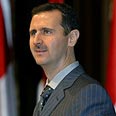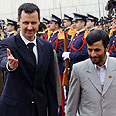

"Of the many assassinations that Israel carried out in a methodical and organized way, the most dangerous thing that Israel did was the assassination of President Yasser Arafat," Assad told a gathering of Arab lawyers.
"This was under the world's gaze and its silence, and not one state dared to issue a statement or stance towards this, as though nothing happened."
Arafat died in Paris on November 11, 2004 at the age of 75 after being rushed from his West Bank compound to a French military hospital.
Israel has denied being responsible for the deterioration in Arafat's health before his death and has denied poisoning him.
In his speech Assad also referred to the Palestinian issue, and claimed the current international situation does not allow for peace negotiations to go forward. The president also slammed the so called "New World Order," describing the situation instead as "global chaos."
It was not Israel's failure to comply with Arab demands that impeded the peace process, Assad said, but rather the forces operating within the new global order and the international community which backed out on its commitment to peace.
Syrian support for Iran
The Syrian president has made his recent statements in wake of a two days-visit by Iranian President Mahmoud Ahmadinejad to Damascus, who arrived in the state on Thuesday.
"We support the right of Iran and any state in the world to acquire peaceful technology," Assad told a joint news conference after the talks. "Countries who oppose this gave no convincing reason, regardless of whether it is legitimate or not."
Assad renewed Syria's call for a Middle East free of nuclear weapons and said "the beginning should be with Israel". The Jewish state is widely believed to have nuclear weapons.
'Restraint and patience in Lebanon needed'
Assad also said he supported stability in Lebanon and called for an end to what he called foreign interference there.
Lebanon has been rocked by more bombings and killings since former Lebanese Prime Minister Rafik Hariri's death for which many Lebanese politicians blame Syria.
International and Lebanese pressure forced Syria to end its 29-year military presence in its smaller neighbor in April.
"We believe that the Lebanese people can find a solution and I call on all factions to show restraint and patience," Ahmadinejad said.
Roee Nahmias contributed to the report















